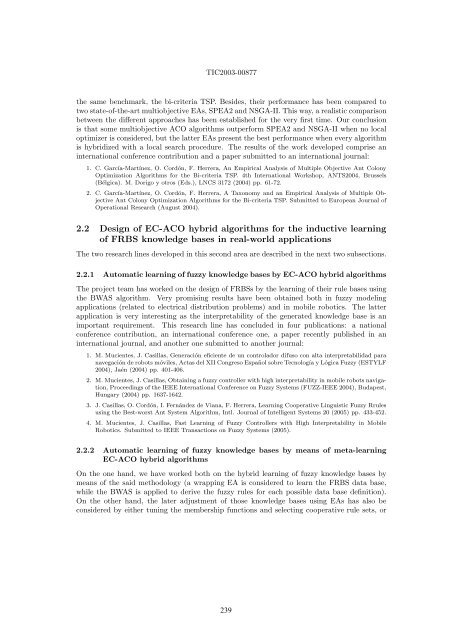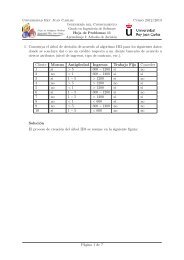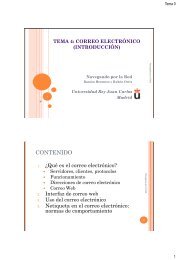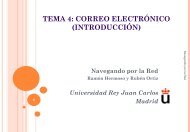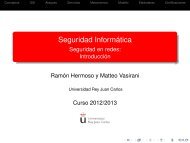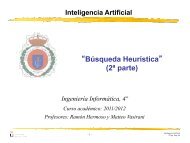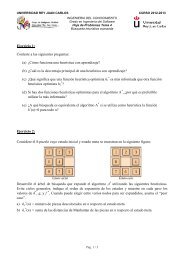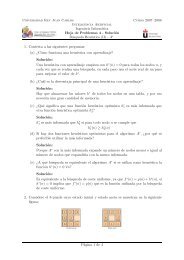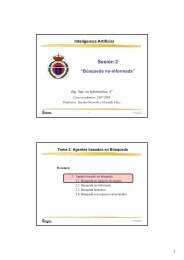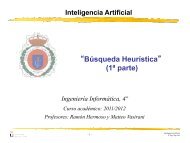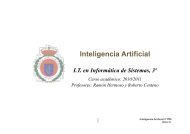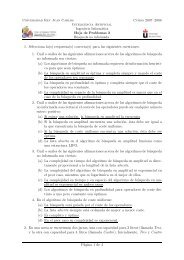GLIRS-II - Grupo de Inteligencia Artificial - Universidad Rey Juan ...
GLIRS-II - Grupo de Inteligencia Artificial - Universidad Rey Juan ...
GLIRS-II - Grupo de Inteligencia Artificial - Universidad Rey Juan ...
You also want an ePaper? Increase the reach of your titles
YUMPU automatically turns print PDFs into web optimized ePapers that Google loves.
TIC2003-00877<br />
the same benchmark, the bi-criteria TSP. Besi<strong>de</strong>s, their performance has been compared to<br />
two state-of-the-art multiobjective EAs, SPEA2 and NSGA-<strong>II</strong>. This way, a realistic comparison<br />
between the different approaches has been established for the very first time. Our conclusion<br />
is that some multiobjective ACO algorithms outperform SPEA2 and NSGA-<strong>II</strong> when no local<br />
optimizer is consi<strong>de</strong>red, but the latter EAs present the best performance when every algorithm<br />
is hybridized with a local search procedure. The results of the work <strong>de</strong>veloped comprise an<br />
international conference contribution and a paper submitted to an international journal:<br />
1. C. García-Martínez, O. Cordón, F. Herrera, An Empirical Analysis of Multiple Objective Ant Colony<br />
Optimization Algorithms for the Bi-criteria TSP. 4th International Workshop, ANTS2004, Brussels<br />
(Bélgica). M. Dorigo y otros (Eds.), LNCS 3172 (2004) pp. 61-72.<br />
2. C. García-Martínez, O. Cordón, F. Herrera, A Taxonomy and an Empirical Analysis of Multiple Objective<br />
Ant Colony Optimization Algorithms for the Bi-criteria TSP. Submitted to European Journal of<br />
Operational Research (August 2004).<br />
2.2 Design of EC-ACO hybrid algorithms for the inductive learning<br />
of FRBS knowledge bases in real-world applications<br />
The two research lines <strong>de</strong>veloped in this second area are <strong>de</strong>scribed in the next two subsections.<br />
2.2.1 Automatic learning of fuzzy knowledge bases by EC-ACO hybrid algorithms<br />
The project team has worked on the <strong>de</strong>sign of FRBSs by the learning of their rule bases using<br />
the BWAS algorithm. Very promising results have been obtained both in fuzzy mo<strong>de</strong>ling<br />
applications (related to electrical distribution problems) and in mobile robotics. The latter<br />
application is very interesting as the interpretability of the generated knowledge base is an<br />
important requirement. This research line has conclu<strong>de</strong>d in four publications: a national<br />
conference contribution, an international conference one, a paper recently published in an<br />
international journal, and another one submitted to another journal:<br />
1. M. Mucientes, J. Casillas, Generación eficiente <strong>de</strong> un controlador difuso con alta interpretabilidad para<br />
navegación <strong>de</strong> robots móviles, Actas <strong>de</strong>l X<strong>II</strong> Congreso Español sobre Tecnología y Lógica Fuzzy (ESTYLF<br />
2004), Jaén (2004) pp. 401-406.<br />
2. M. Mucientes, J. Casillas, Obtaining a fuzzy controller with high interpretability in mobile robots navigation,<br />
Proceedings of the IEEE International Conference on Fuzzy Systems (FUZZ-IEEE 2004), Budapest,<br />
Hungary (2004) pp. 1637-1642.<br />
3. J. Casillas, O. Cordón, I. Fernán<strong>de</strong>z <strong>de</strong> Viana, F. Herrera, Learning Cooperative Linguistic Fuzzy Rrules<br />
using the Best-worst Ant System Algorithm, Intl. Journal of Intelligent Systems 20 (2005) pp. 433-452.<br />
4. M. Mucientes, J. Casillas, Fast Learning of Fuzzy Controllers with High Interpretability in Mobile<br />
Robotics. Submitted to IEEE Transactions on Fuzzy Systems (2005).<br />
2.2.2 Automatic learning of fuzzy knowledge bases by means of meta-learning<br />
EC-ACO hybrid algorithms<br />
On the one hand, we have worked both on the hybrid learning of fuzzy knowledge bases by<br />
means of the said methodology (a wrapping EA is consi<strong>de</strong>red to learn the FRBS data base,<br />
while the BWAS is applied to <strong>de</strong>rive the fuzzy rules for each possible data base <strong>de</strong>finition).<br />
On the other hand, the later adjustment of those knowledge bases using EAs has also be<br />
consi<strong>de</strong>red by either tuning the membership functions and selecting cooperative rule sets, or<br />
239


